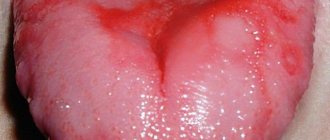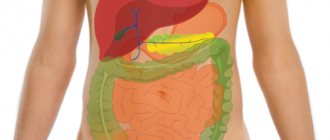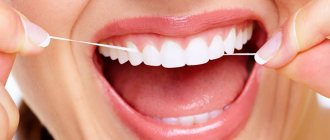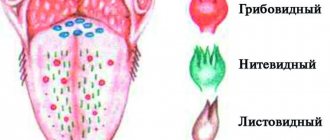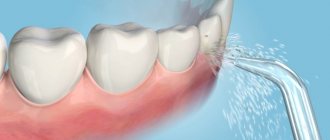Where does bad breath come from in a child?
Bad breath in adults and children is present in almost 80% of the population and occurs due to the accumulation of a large number of bacteria in the oral cavity. But in 25% of cases it is caused by dysfunction of the digestive system and other equally serious diseases.
List of main reasons:
- Poor oral hygiene.
Most often, children suffer from this disorder because they do not always follow the rules of hygiene. All parents know how difficult it is to teach a child to brush their teeth thoroughly twice a day. This is how a child develops bad breath. - Poor nutrition.
The problem may also arise due to a certain diet - an abundance of sweet or protein foods, consumption of foods with a specific aroma (onions, garlic, cabbage). - Increased body temperature.
During illness, metabolism increases, moisture is quickly removed from the body, so dry mouth can also cause halitosis. Therefore, temperature and bad breath in a child are also closely related. - Change of bite.
When teething, bad breath in children is associated with partial decomposition of the oral mucosa, since a new tooth injures the gums.
All these causes of bad breath in a child are not dangerous to health. The problem will disappear on its own after hygiene procedures, teething or the baby’s recovery. However, some symptoms should cause an immediate reaction in parents, and we will talk about them in more detail.
First aid for hangover syndrome
The smell of alcohol actually comes from the lungs. Therefore, it is necessary to help the body promptly remove alcohol. How to get rid of the smell after alcohol? For minor intoxication, the following methods are relevant.
- Drink plenty of fluids. You need to drink regular boiled or mineral water. The volume of liquid should be up to 1.5-2 liters. As a result, the urinary system will begin to remove metabolites from the body faster.
- Physical activity. It is recommended to take a walk in the fresh air for at least half an hour. In the apartment it is necessary to keep the window open. Breathing exercises are useful: hyperventilation effectively cleanses the lungs, and the smell of fumes weakens. It is enough to take quick and deep breaths for 5-10 minutes, after which the first results will appear.
- Sauna, bathhouse. Due to the hot steam, sweating increases, and the remaining alcohol is eliminated faster. But if you have diseases of the cardiovascular system, it is recommended to stop in the shower, alternating dousing with hot and cold water. Water procedures cleanse the pores of the skin surface and rid the body of toxins.
Causes of iso smell in children
Why does my child have bad breath? All parents are sensitive to the health of their children, and any changes in the baby’s well-being cause anxiety and sometimes panic. We have compiled a table of deviations in which concern is more than justified.
| Type of smell | Causes | What to do? |
| Acetone smell from child's mouth | Appears in acetone syndrome. This dangerous condition is characterized by the accumulation of acetone and acetoacetic acid in the body, which in the future can lead to the development of tachycardia, diabetes or urolithiasis. | If you suspect the occurrence of these diseases, you should immediately call an ambulance and give the patient a teaspoon of boiled water every 10 minutes. |
| Putrid odor from a child's mouth | Occurs as a result of ENT diseases, dental diseases, and esophageal disorders. | It is necessary to contact a dentist who will identify the exact cause of the disorder and prescribe appropriate treatment. |
| Sour breath in a child | Indicates problems with the gastrointestinal tract, in particular the presence of gastritis. | An examination by a gastroenterologist will show an accurate diagnosis. |
| Rotten breath in a child | May be accompanied by associated symptoms such as diarrhea, bloating, and coating on the tongue. This means that air filled with hydrogen sulfide gases comes out of the stomach. The smell of egg from a child’s mouth can indicate increased acidity of gastric juice, liver failure, ulcers, kidney disease, and even gastrointestinal oncology. | The gastroenterologist will order tests and find out why this situation has arisen. |
| Vinegar smell from child's mouth | Perhaps this is a sign of malfunction of the pancreas, intestinal dysbiosis or periodontal disease. | The dentist will determine the source of the problem and help your child regain fresh breath. |
| Sweet odor from a child's mouth | Indicates hepatitis or cirrhosis of the liver. | In this case, parents should urgently visit a gastroenterologist. |
| The smell of snot from a child's mouth | Signals inflammatory processes in the nasopharynx. | An ENT specialist deals with this disorder; he will diagnose and prescribe the correct course of antibiotics for the baby. |
| Smell of vomit from a child's mouth | Characterizes poor outflow of bile. | An ultrasound of the abdominal organs will help eliminate the disorder. |
Dry mouth is another possible cause of bad breath in a child. Infants constantly accumulate saliva in their mouths. It is saturated with oxygen, which destroys harmful bacteria on the gums and tongue. Older children produce less saliva, and dry mouth can be attributed to a number of factors.
- Adenoids, formations on the tonsils, block the nasopharynx. Air enters the lungs through the mouth much more freely than through the nose.
- Sinusitis or chronic runny nose also prevents the baby from inhaling through the nose.
- A deviated nasal septum may obstruct air flow.
- Unconscious breathing through the mouth during sleep. In this case, you may notice a particularly strong odor from the child’s mouth in the morning, then the best solution would be an examination by a pediatric otolaryngologist.
How does a child's age affect bad breath?
Surely all parents remember the smell of a baby's breath - a pleasant, milky aroma.
This happens as a result of the activity of lactic acid bacteria, which create a favorable environment and prevent pathogenic microflora from multiplying. The smell from the mouth of a child under one year old should be exactly like this, reeking of milk. Bad breath in a child aged 2-3 years indicates poor oral hygiene, since the child at this age is just learning to brush his teeth properly. Observe him during the procedure and explain how important it is to monitor the condition of the mouth.
Bad breath in a 4-year-old child is most likely associated with an excess of sweets, protein and carbohydrate foods, since children at this age actively explore the world around them, discover new tastes and put not only edible treats in their mouths, but also any interesting things in general .
In a 5-6 year old child, bad breath indicates the possible development of pathological processes. The dentist and pediatrician will find out the cause of the problem and prescribe treatment while the disease is at an early stage.
Bad breath after 10 years in a child is an alarming symptom. He can talk about poor nutrition, disturbances in the functioning of the body. If the smell persists for a long time, visit a specialist as soon as possible.
Fast and effective ways
After drinking alcoholic beverages, an unpleasant odor begins to appear within an hour. When alcohol is processed, acetic acid is found in the body. It is excreted only through the lungs. Only a minimal amount is excreted through urine and sweat.
The smell of vodka can last for 36 hours. The fume disappears when alcohol is completely processed in the body. If you have to go to a meeting in the morning or have serious matters to attend to, you can use several proven methods:
- Changing clothes. Fabrics tend to absorb aldehyde vapors. The scent holds up well, so you need to take a shower and put on clean clothes.
- Shower with cool water. This method is good for getting rid of fumes. Aldehyde vapors are excreted not only by the lungs, but also by the skin. Water procedures help quickly and effectively.
- A glass of warm water with lemon juice. To improve the taste, you can add a teaspoon of liquid honey. This product works well to remove aldehyde residues. Additionally, the body tone increases, strength and vigor increase.
At home, charging helps a lot. After a good party and get-togethers with friends, it’s hard to do physical exercise. But a horizontal position aggravates your health and condition, so you need to drink water and start exercising. This is one of the reasons to help yourself with a hangover.
During the day you need to follow a drinking regime. It is not recommended to buy carbonated drinks. They can be replaced with chamomile tea, an infusion of diuretic herbs. All methods help get rid of fumes and have no contraindications or restrictions. To quickly improve your well-being, you can also use medications that are sold in pharmacies. These are special sorbents that not only eliminate unpleasant odors, but also affect the functioning of the stomach and intestines, and minimize the symptoms that arise from alcohol intoxication. Alcohol processing products begin to be eliminated several times faster, so the person immediately feels relief and his condition improves.
Treatment of bad breath in children
In most cases, halitosis does not require special treatment; it is enough to pay attention to your baby’s oral hygiene, change the diet, and reduce the consumption of sweets and protein foods. You can also get rid of an unpleasant odor using traditional methods - for example, rinsing your mouth with an infusion of chamomile, mint or oak bark.
If, after taking the measures, the smell still does not disappear, you should contact your pediatric dentist.
During diagnosis, the doctor must assess the intensity of the unpleasant odor, examine the tongue and oral cavity, ask the patient to take the necessary tests, and also conduct an instrumental examination or x-ray. Based on this data, he can prescribe the necessary medications himself or refer you for consultation to a specialized specialist - a gastroenterologist, an ENT specialist, or, in some cases, a pulmonologist. If the cause of bad breath in a child is identified in time, treatment will proceed faster, and the risk of reoccurrence of this phenomenon will be reduced to almost zero.
Prevention and treatment
Blood and urine analysis - with elevated acetone
Suspicion of ketoacidosis requires immediate hospitalization. The first treatment measure is the administration of insulin, which normalizes the chemical state of the blood. Insulin administration also prevents the development of coma and other dangerous complications.
Additional measures to treat the condition:
- Replenishing fluid in the body. If the child is unconscious, fluid is administered intravenously.
- Compensation for lack of electrolytes. Also via intravenous administration.
- Therapy of infectious and inflammatory diseases that provoke ketoacidosis.
To treat ketoacidosis, your doctor may prescribe a different dosage of insulin. The following types of drug may be prescribed:
- Fast acting insulin.
- Long acting insulin.
Prescribing different types of insulin allows you to monitor the patient’s condition on a long-term basis and prevent relapses of the disease.
Preventive measures:
Preventing bad breath in children
To prevent the occurrence of this unpleasant problem, you should follow a few simple but very important rules.
- From the moment the first baby tooth emerges, parents need to brush their baby’s teeth twice a day with a soft brush. And when the child grows up, make sure that he correctly performs the procedure on his own.
- Teach your child to brush his teeth, show him by personal example how to do it. If you have difficulty in this matter, contact your hygienist for advice. This specialist has many manuals, films and interesting devices to teach your child the necessary skills in a playful way.
- Review your diet, add more sour fruits - apples, oranges and lemons increase salivation.
- Eliminate sweets from your diet and replace them with honey.
- Make sure your child drinks enough fluids. But not juice and soda, but clean drinking water.
- Visit your dentist regularly for preventative checkups.
Dear parents, remember that strong breath in children is a possible symptom of much more serious problems. It is in your power to prevent the formation of pathological processes in the body or stop their development at an early stage. Pay close attention to any negative changes in your child's health to prevent complications and chronic diseases in the future.



